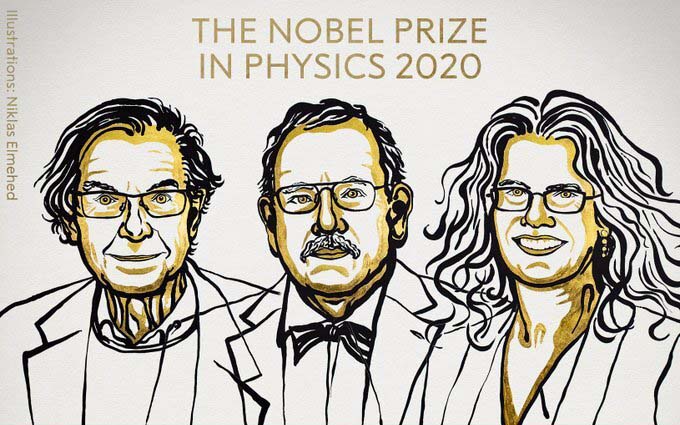Three researchers share the Nobel Prize in Physics for black hole discoveries.
October 6, 2020 | Leah Poffenberger
The Royal Swedish Academy of Sciences has announced the recipients of the 2020 Nobel Prize in Physics, which has been awarded for discoveries about black holes, one of the most exotic phenomena in the universe. This year’s prize is awarded to Roger Penrose (University of Oxford), Reinhard Genzel (Max Planck Institute for Extraterrestrial Physics, and University of California, Berkeley), and Andrea Ghez (University of California, Los Angeles). Genzel and Ghez are both APS Fellows. Ghez is also the fourth woman to receive the Nobel Prize in Physics, joining Marie Curie, Maria Goeppert-Mayer, and Donna Strickland.
One half of the Nobel Prize in Physics is awarded to Penrose “for the discovery that black hole formation is a robust prediction of the general theory of relativity.” The other half is awarded jointly to Genzel and Ghez “for the discovery of a supermassive compact object at the center of our galaxy.” Together, their discoveries were groundbreaking, proving black holes can exist within the framework of Einstein’s theory of relativity and that one does exist at the center of the Milky Way.
“This is very exciting news,” said APS President Phil Bucksbaum. “Andrea Ghez and Reinhard Genzel lead competing experimental groups that have been tracking the motion of stars near the center of the Milky Way for more than twenty years, making precision tests of General Relativity and particularly predictions based on Roger Penrose’s work that there could be a black hole at the galactic center. This work has made pioneering use of adaptive optics on the Keck telescope, and it has led to the understanding that supermassive black holes inhabit the centers of many galaxies. I’m also pleased to see the Swedish academy recognize a fourth woman Nobel Laureate.”
The Nobel Committee cited papers published in APS journals in their announcement, including two papers in Physical Review Letters (PRL), and one in Reviews of Modern Physics. This marks the tenth consecutive year that a PRL article coauthored by one of the recipients has been cited in the Scientific Background of the Physics or Chemistry award.
“APS congratulates the 2020 Nobel Laureates for their outstanding contributions to astrophysics, and the understanding of our universe,” said APS CEO Kate Kirby. “I sincerely hope that this award will inspire the next generation of physicists, especially young women, whom we are committed to supporting at every level.”
Penrose receives half of the Nobel Prize in Physics for his use of mathematical methods to show that black holes are a direct consequence of the theory of general relativity. Albert Einstein had not believed black holes existed, but in 1965, ten years after Einstein’s death, Penrose published a groundbreaking article describing black holes and their formation. Penrose showed that the theory of relativity accounts for the formation of black holes, despite containing a singularity at which the known laws of nature cease to apply. His contributions to general relativity also earned Penrose the 1971 Dannie Heineman Prize for Mathematical Physics, jointly awarded by APS and the American Institute of Physics.
Genzel and Ghez share half of the Nobel Prize for their separate but complementary efforts to study a region called Sagittarius A*, located at the center of our galaxy. “I’m thrilled that the Nobel Committee has recognized the critical importance of the work of Genzel and Ghez, which established beyond a doubt the existence of a supermassive black hole at the center of the Milky Way, and the work of Penrose with Stephen Hawking, predicting the existence of black holes,” said Glennys Farrar, Professor of Physics at New York University and Chair of the APS Division of Astrophysics.
Beginning in the early 1990s, Genzel and Ghez each led groups of researchers mapping the orbits of bright stars close to the center of the galaxy. Based on their measurements, both groups found that the movement of these stars is affected by an extremely heavy, invisible object—most likely a four million solar-mass black hole. Both Genzel and Ghez have given talks at recent APS April meetings, Genzel in 2020 and Ghez in 2019, and Ghez received the Maria Goeppert-Mayer Award from APS in 1999.
“I hope I can inspire other young women into the field. It’s a field that has so many pleasures, and if you are passionate about the science, there’s so much that can be done,” said Ghez by phone during the Nobel announcement in Stockholm.
The Nobel Prize, first awarded in 1901, is widely considered the highest honor in science, economics, and literature. The 2020 Nobel Laureates will be awarded medals separately in their home countries, and they will receive 10 million Swedish krona (just over $US 1.1 million), half of which goes to Penrose, and the other half to Genzel and Ghez. All three laureates will be honored at the 2021 Nobel Banquet after the cancellation of the 2020 ceremonies.

Niklas Elmehed (c) Nobel Media
Articles Cited by the Nobel Committee
The following articles have been made free-to-read by APS:
R. Penrose, "Asymptotic Properties of Fields and Space-Times," Phys. Rev. Lett. 10, 66 (1963).
R. Penrose, "Gravitational Collapse and Space-Time Singularities," Phys. Rev. Lett. 14, 57 (1965).
Related Articles
The following articles have been made free-to-read by APS:
| |||||||

